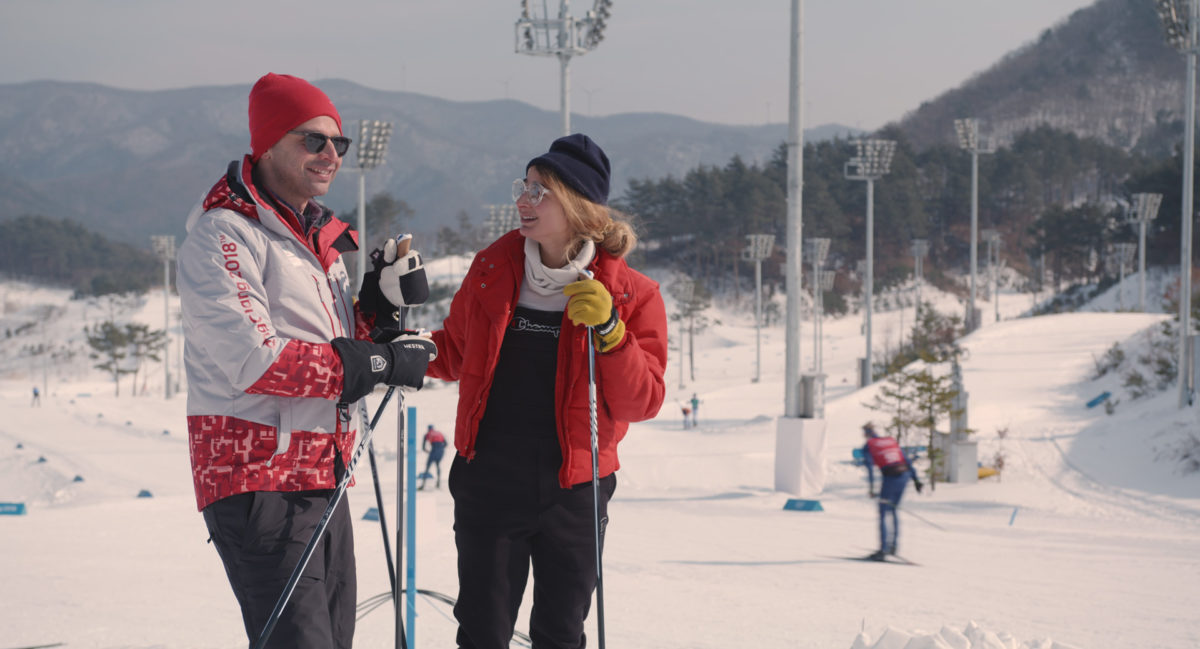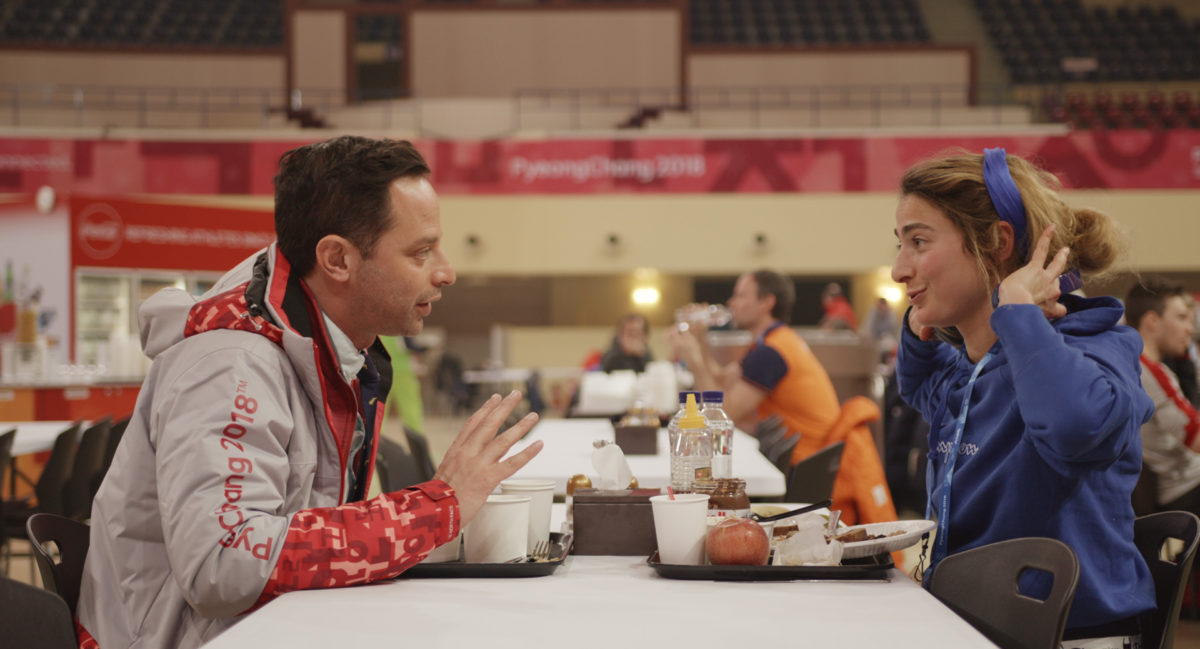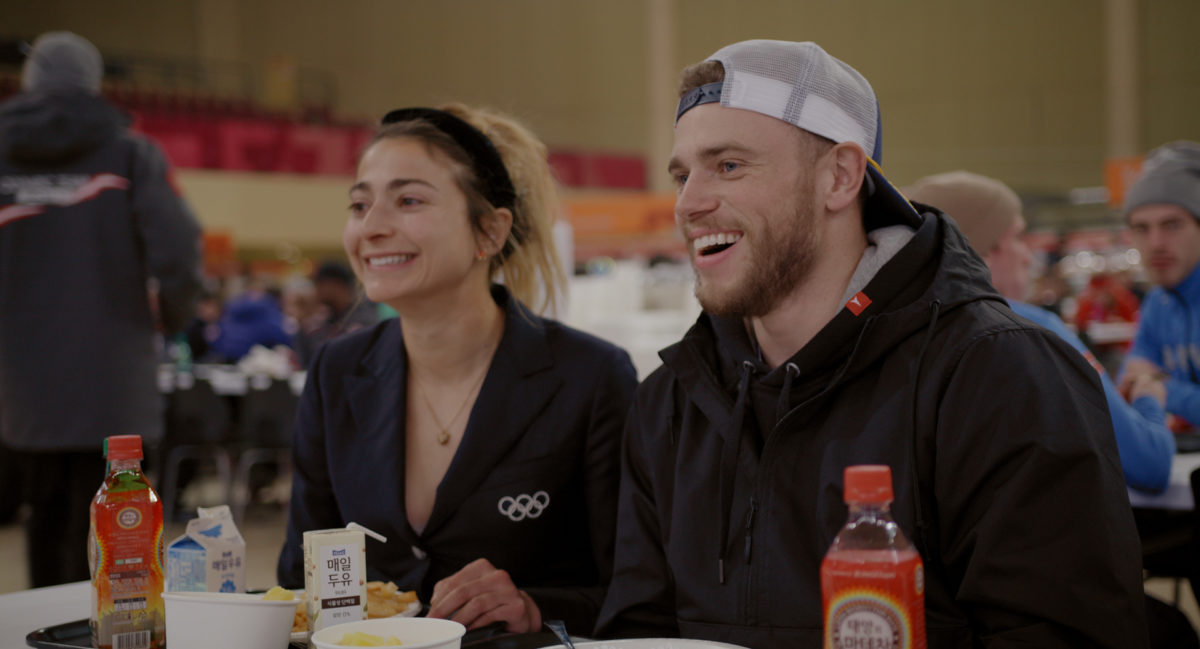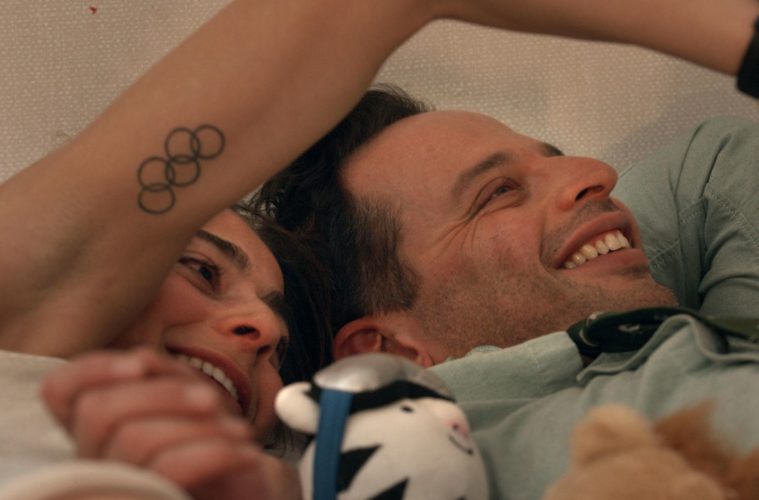Director Jeremy Teicher and writer/actor Alexi Pappas already made a film about the latter’s Olympic ambitions entitled Tracktown. Shot two years before she placed 17th in the women’s 10,000m event at the 2016 Rio Olympics, it dealt with a physically injured athlete forced into taking a break amidst the chaos of Olympic Trials preparation. It was therefore only natural that the pair would choose to tackle a story dealing with the psychological and emotional experience of qualifying and competing too. Bolstered by her first-hand knowledge of what it was like to be an athlete on the ground alongside the couple’s shared history as filmmakers, the International Olympic Committee invited them aboard their Olympic Art Project and provided unprecedented access to film at the 2018 PyeongChang Winter Games.
The result is Olympic Dreams, a heartfelt and introspective journey that delves within the human psyche caught in stasis. Teicher acted as a one-man crew charged with direction, cinematography, and sound while Pappas embodied the lead’s cross-country skiing hopeful Penelope. The two formed a screenwriting trifecta with co-star Nick Kroll, hatching an idea for where they could go and adjusting on the fly once they found themselves immersed in the atmosphere of a live Olympic event unfolding in real time. Think Before Sunrise and Once in terms of narrative scope and intimacy with a dialogue-heavy, experiential progression pitting Pappas’ twenty-two year-old athlete and Kroll’s thirty-seven year-old volunteer dentist (Dr. Ezra) together to spark a friendship born from the relatable sense of existential uncertainty both are unable to shake.

They waste no time by starting everything off with the juxtaposition of these characters’ differing attitudes upon arrival. Penelope has a look of fear and isolation while Ezra perpetually wears on his face the enthusiasm of being in Korea to absorb the event’s inherent excitement. Such reactions aren’t surprising when you think about where they’re coming from. This is the culmination of decades of work for Penelope and she doesn’t have the opportunity to enjoy any of it considering her meet begins right after the opening ceremony. Ezra conversely feels no pressure at all. He doesn’t even know where he’s supposed to go and yet he’s more than willing to simply get lost until he does. Ezra has everything to gain by being here, Penelope everything to lose.
Both are found alone and on their phones regardless, though. She’s trying to reach her father and get the support she’s unsure she’ll be able to find on her own. He’s attempting to speak with his (ex) fiancé (they’re on a break) to share his elation with someone who knows him and won’t simply see his smile as that of some overly excited American sailing past endearment to embarrassment. They yearn for connection—someone to share the good times (and bad) in order to not let the moment pass. They’re awkward, over-bearing in equal measure if in dissimilar ways, and scared to let an outsider become the rock they’re missing. So their serendipitous meeting unsurprisingly cultivates an authentically complex mix of father/daughter support with romantic potential.
Because just as it appears he had everything to gain and she nothing to lose, time reveals the opposite might be true instead. The fact that Ezra is so desperate to get in touch with his ex shows the willingness he possesses to ignore the opportunity this trip provides as a springboard to building the confidence necessary to achieve the goals he has thus far pushed to the side. And Penelope finishing her responsibilities on Day One provides her the room to meet new people, have fun, and discover whether months of the opposite was worth it. The people surrounding her in the Olympic Village understand her sacrifice and relate to the disappointment of losing despite the world telling them that qualifying is its own victory. It’s not.

They’re the perfect foils for one another. Ezra can learn something from her boldness to risk safety and security for four years to reach this moment and Penelope can learn how to use the passion and dedication of a career as a means for happiness from him. She’s left everyone behind to take this personal journey while he can’t sever the bond he has with someone who refused to stand by his desire to travel. He’s leveraged his dentistry to finally travel to a foreign country while she sits lamenting the past in a way that prevents her from seeing the future. They’re polar opposites and yet identical mirrors onto what could be: his break from convention and her embrace of obsession. You can love what you do.
It’s not just them leaning on each other to discover these things, though. That would be too easy and unrealistic since no one changes the fundamental ways in which they operate overnight. We fight that change. We wonder if what works for some people can work for us and fear the unpredictable process of finding out. So while Penelope and Ezra can talk each other into throwing caution to the wind to go on adventures around PyeongChang and the Olympic compound (while meeting other athletes like Gus Kenworthy along the way), they cannot force the other to open their eyes. Not only is that something we must do on our own, it’s something we often can’t do at all without the hindsight of selfish cruelty as defense mechanism.

Both Penelope and Ezra retreat within their bubbles to push the other away and it’s heartbreaking to watch because we’ve experienced the terror of opening up and letting go respectively that they must endure. Kroll is very good in a role that allows him to pivot away from his usual comic relief persona to be sweet and funny and complicated, but Pappas is even better as a woman unsure of her very identity outside of the sport to which she’s dedicated her entire life. They’re both emotionally stunted to a point, but her pain is raw in a way his isn’t because she’s searching for validation rather than escape. Penelope yearns for someone to ground her in reality once the “dream” is over and her purpose suddenly confused.
That’s a potent message against this backdrop because external viewers are quick to dismiss Olympic athletes as people who know who they are. We don’t think about the psychological toll their journey takes or the guilt and regret sown by their choices. That’s surely what the IOC saw in Pappas and Teicher’s pitch to let them expand a planned series of shorts into a feature. Only with this extra room to maneuver could they peer behind the curtain at the loneliness of giving everything to this one single thing. How do you begin to feel human again afterwards? We all need reminding that we’re more than our achievements or failures. Whether from a kind gesture, honest conversation, or passionate kiss, nothing heals our melancholy better than being seen.
Olympic Dreams opens in limited release and on VOD February 14.

